| Srl | Item |
| 1 |
ID:
157389
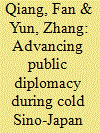

|
|
|
|
|
| Summary/Abstract |
Tense political relations are seen as a barrier to China's public diplomacy with Japan. despite various setbacks, Confucius Institute, a classic example of public diplomacy, have continued to stay open in Japan. This paper uses the Confucius Institute at Ritsumeikan (CIR) as a case study to explore how public diplomacy can be carried out when political relations between China and Japan are cold. It concludes that cold political relations do not necessarily mean public diplomacy will fail. Good cooperation with Japanese partners can bring positive results.Also, choosing the right partner is important; government interference should be avoided. Finally, China should deal with each Confucius Institute differently, and Japanese universities enthusiasm should be stimulated through encouragement and retreat mechanisms.
|
|
|
|
|
|
|
|
|
|
|
|
|
|
|
|
| 2 |
ID:
157396


|
|
|
|
|
| Summary/Abstract |
The UK has been keeping a close eye on Hong Kong, not only because of their traditional historical links but also to maintain its own political and economic interests. With Hong Kong undergoing rapid changes in recent years, the UK's policy on Hong Kong has also made some adjustments. It still calls on restarting political reform in Hong Kong, emphasizing the importance of judicial independence, and trying to use Hong Kong to expand trade in China and in the Asia-Pacific region. In the future, China should pay more attention to UK''s policy on Hong Kong under the framework of China-UK relations.
|
|
|
|
|
|
|
|
|
|
|
|
|
|
|
|
| 3 |
ID:
157393
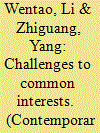

|
|
|
|
|
| Summary/Abstract |
The African economy, with average annual growth of 5% during 1995 to 2014, greatly interests investors but the current security situation hampers regional development and foreign direct investment.Investment in Africa has featured high return and high risk historically, and it remains clear that no single entity can properly solve current security challenges that Africa faces. the moment calls for international joint collaboration and concerted effort on the part of China, the US and African countries.
|
|
|
|
|
|
|
|
|
|
|
|
|
|
|
|
| 4 |
ID:
157371
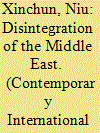

|
|
|
| 5 |
ID:
157394
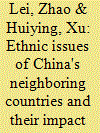

|
|
|
|
|
| Summary/Abstract |
In the international community, the internal ethnic issues of one country can easily spread out of its borders through the impact of internal and external factors to affect the national security of other countries, known as the spillover effect. Presently, the ethnic issues of China's neighboring countries that have real consequences on the country's national security break downmainly into four types; the internal ethnic conflict, the transnational ethnic issue, the issues related with immigrants and the collaboration of the three forces. The risk of spillover can be summed up according to the intensity of its effect in five categores;infiltration, springboard, spillover immigration and harassment. As diverse ethnic issues of the neighboring countries have different effect on China's national security, the Chinese government must grasp the core element of each issue to formulate specific policies.
|
|
|
|
|
|
|
|
|
|
|
|
|
|
|
|
| 6 |
ID:
157398
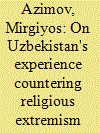

|
|
|
|
|
| Summary/Abstract |
Since the first years of independence, Uzbekistan began to develop and implement a policy of countering religious extremism and addressing the ideological basis of terrorism. Taking into consideration the complexity of this problem, Uzbekistan is comprehensively combating expressions of extremism and terrorism.
|
|
|
|
|
|
|
|
|
|
|
|
|
|
|
|
| 7 |
ID:
157388
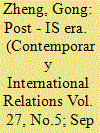

|
|
|
| 8 |
ID:
157377
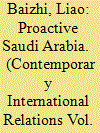

|
|
|
| 9 |
ID:
157383


|
|
|
| 10 |
ID:
157397


|
|
|
|
|
| Summary/Abstract |
Until now the Islamic Republic of Iran's adoption of an independent acitve deterrence strategy, a strategy based on threat assessment and self-assessment, has overall been a success. The sole exception involvedIraq in 1980 and was due to Iran's initial vulnerability following the revolution.As Saudi Arabia maneuvers with influence from US President Donald Trump, and given that Iran is unlikely to withdrawits military nuclear program under the existing security environment, the US and Israel ought to strengthen their nuclear deterrence capabilities against Iran. They need to issue clear, open, official retaliation Commitments under a hypothetical nuclear scenario and bolster them with corresponding military and diplomatic capability.
|
|
|
|
|
|
|
|
|
|
|
|
|
|
|
|
| 11 |
ID:
157395


|
|
|
|
|
| Summary/Abstract |
The North Korea nuclear challenge, urgent on the US foreign policy agenda since Donald Trump took office, has prompted unilateral bilateral and multilateral moves to address rising tension on the peninsula.The underlying logic of US policy, which in November placed the DPRK back on the list of state sponsors of terrorism, promotes negotiation by imposing maximum pressureand by enlisting China's support. Possibly, North Korea will return to negotiations with its nuclear and missile development suspended temporarily. Other Possibilities are a stalemate with North Korea joining the ranks of countries with credible nuclear deterrent, or an emerging crisis that escalates to military of that conflict. the lingering uncertainty is central to northeast Asia security.
|
|
|
|
|
|
|
|
|
|
|
|
|
|
|
|
| 12 |
ID:
157387


|
|
|